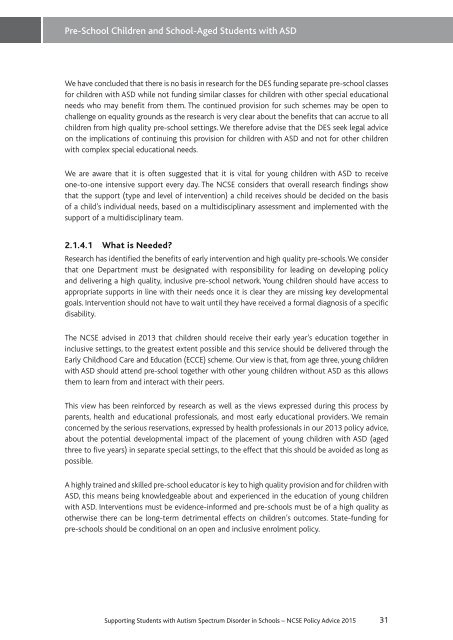Supporting Students with Autism Spectrum Disorder in Schools
1_NCSE-Supporting-Students-ASD-Schools
1_NCSE-Supporting-Students-ASD-Schools
Create successful ePaper yourself
Turn your PDF publications into a flip-book with our unique Google optimized e-Paper software.
Pre-School Children and School-Aged <strong>Students</strong> <strong>with</strong> ASD<br />
We have concluded that there is no basis <strong>in</strong> research for the DES fund<strong>in</strong>g separate pre-school classes<br />
for children <strong>with</strong> ASD while not fund<strong>in</strong>g similar classes for children <strong>with</strong> other special educational<br />
needs who may benefit from them. The cont<strong>in</strong>ued provision for such schemes may be open to<br />
challenge on equality grounds as the research is very clear about the benefits that can accrue to all<br />
children from high quality pre-school sett<strong>in</strong>gs. We therefore advise that the DES seek legal advice<br />
on the implications of cont<strong>in</strong>u<strong>in</strong>g this provision for children <strong>with</strong> ASD and not for other children<br />
<strong>with</strong> complex special educational needs.<br />
We are aware that it is often suggested that it is vital for young children <strong>with</strong> ASD to receive<br />
one-to-one <strong>in</strong>tensive support every day. The NCSE considers that overall research f<strong>in</strong>d<strong>in</strong>gs show<br />
that the support (type and level of <strong>in</strong>tervention) a child receives should be decided on the basis<br />
of a child’s <strong>in</strong>dividual needs, based on a multidiscipl<strong>in</strong>ary assessment and implemented <strong>with</strong> the<br />
support of a multidiscipl<strong>in</strong>ary team.<br />
2.1.4.1 What is Needed?<br />
Research has identified the benefits of early <strong>in</strong>tervention and high quality pre-schools. We consider<br />
that one Department must be designated <strong>with</strong> responsibility for lead<strong>in</strong>g on develop<strong>in</strong>g policy<br />
and deliver<strong>in</strong>g a high quality, <strong>in</strong>clusive pre-school network. Young children should have access to<br />
appropriate supports <strong>in</strong> l<strong>in</strong>e <strong>with</strong> their needs once it is clear they are miss<strong>in</strong>g key developmental<br />
goals. Intervention should not have to wait until they have received a formal diagnosis of a specific<br />
disability.<br />
The NCSE advised <strong>in</strong> 2013 that children should receive their early year’s education together <strong>in</strong><br />
<strong>in</strong>clusive sett<strong>in</strong>gs, to the greatest extent possible and this service should be delivered through the<br />
Early Childhood Care and Education (ECCE) scheme. Our view is that, from age three, young children<br />
<strong>with</strong> ASD should attend pre-school together <strong>with</strong> other young children <strong>with</strong>out ASD as this allows<br />
them to learn from and <strong>in</strong>teract <strong>with</strong> their peers.<br />
This view has been re<strong>in</strong>forced by research as well as the views expressed dur<strong>in</strong>g this process by<br />
parents, health and educational professionals, and most early educational providers. We rema<strong>in</strong><br />
concerned by the serious reservations, expressed by health professionals <strong>in</strong> our 2013 policy advice,<br />
about the potential developmental impact of the placement of young children <strong>with</strong> ASD (aged<br />
three to five years) <strong>in</strong> separate special sett<strong>in</strong>gs, to the effect that this should be avoided as long as<br />
possible.<br />
A highly tra<strong>in</strong>ed and skilled pre-school educator is key to high quality provision and for children <strong>with</strong><br />
ASD, this means be<strong>in</strong>g knowledgeable about and experienced <strong>in</strong> the education of young children<br />
<strong>with</strong> ASD. Interventions must be evidence-<strong>in</strong>formed and pre-schools must be of a high quality as<br />
otherwise there can be long-term detrimental effects on children’s outcomes. State-fund<strong>in</strong>g for<br />
pre-schools should be conditional on an open and <strong>in</strong>clusive enrolment policy.<br />
<strong>Support<strong>in</strong>g</strong> <strong>Students</strong> <strong>with</strong> <strong>Autism</strong> <strong>Spectrum</strong> <strong>Disorder</strong> <strong>in</strong> <strong>Schools</strong> – NCSE Policy Advice 2015 31


